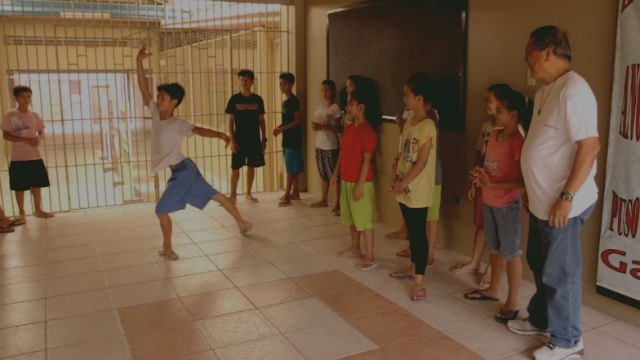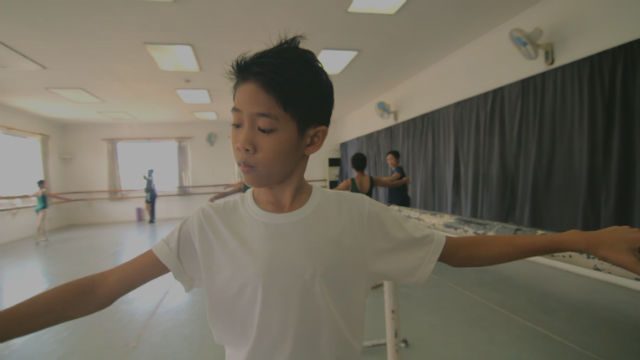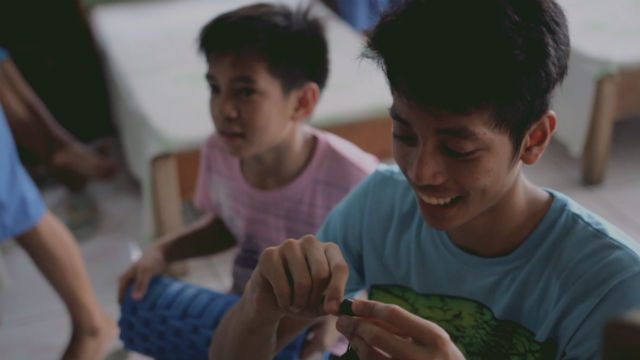SUMMARY
This is AI generated summarization, which may have errors. For context, always refer to the full article.

MANILA, Philippines – When Father Rocky Evangelista committed his life to the cause of poor and abandoned children in 1993, he knew he had to do something about the situation of street kids in Metro Manila.
“Half of Filipino children don’t even finish high school. But yet these poor children have a lot of potential. The public, reach or poor alike, should take this cause of poor children as part of rebuilding our nation,” Evangelista said.
In the same year, Tuloy sa Don Bosco Foundation, an institution that caters to Metro Manila’s poor and abandoned children, was born.
“Tuloy Foundation is an exclusive foundation – exclusively for the poor, abused, orphaned, and abandoned children who can still follow a curriculum that will prepare them for the future,” Evangelista said.
The foundation accepts children ages 9 to 17 years old. They are either given residential or non-residential care.
Evangelista added: “What do we want to do? Our vision is to ‘redeem from helplessness and empower to choose right’ these almost hopeless kids. We provide everything to rebuild their hope and that starts with rebuilding their dignity.”
‘Above normal’ care
Well-designed dormitories and school buildings occupy the institution’s guarded compound. In between the buildings, beautiful gardens and small parks fill the space. Any visitor would think this is a campus of a private university or college.
This is Tuloy Foundation now, 22 years after it was founded. But it was not always as comfortable and beautiful, Evangelista recalled.
Tuloy started with 12 children in a 4-square meter room at the back of the church of Don Bosco Makati. As the number of kids grew, Evanglista found support from private groups and individuals. They were eventually leased a 45,000 sqm space for free use up to a hundred years.
Evangelista knew he had to build the best environment for the children.
“People think this is an exclusive school for those who can pay. No, we treat poor kids the best that we can to approximate the treatment that kids who are not poor get. Other than that, we are very deliberate in wanting to be a center for excellence so we can rebuild the mindsets of the students,” he added.
Holistic formation
Unlike other institutions that simply provide the basic necessities of children and other sectors, Tuloy goes beyond fundamental care.
“The human person does not only go to school, and learn a skill. The human person is not only someone earning money. But a human person should be someone who’s so confident, so complete,” Evanglista noted.
He added: “Therefore, we are not only here to fill up the stomach, and put a shirt on the back, but to develop the totality of the person so that they can face the totality of circumstances and realities in the world.”

The children are given opportunities to gain technical skills so they can be reintegrated into society. Some former kids are now working as hoteliers and car technicians, among other jobs, in the Philippines and abroad.
“Rarely do they go back to their old life – begging, prostituting, stealing, snatching in the streets. Where do we attribute this success? This comes from the sense of being given a second chance,” Evangelista added.
While inside the foundation, children are also given a chance to pursue sports and the arts.
Street kids turned ballet dancers
Before being taken by the foundation, Rodney Catubay roamed the streets of Metro Manila. From dancing hip-hop, he has now pursued ballet for the last 4 years.
The 18-year-old said the dance changed his perspective.
“Before I did ballet, I wanted to be a simple citizen – to repair refrigerators and air conditioners for a living. Now that I’m a ballerino, I’m aiming for a higher goal. I want to be the principal dancer of a company,” Catubay said.

Pursuing ballet is tougher than Catubay imagined. He is always pushed to his limits.
“In ballet, you need to think fast so you can pick up the right combinations. You need discipline and hard work. Our teachers always push us to be the best we can be,” he noted.
Recently, Catubay was accepted to be part of Ballet Manila, one of the most prestigious dance companies in the Philippines.
Entering the world stage
Edmar Sumera was influenced by Catubay to pursue ballet when he entered Tuloy Foundation. He said the dance also changed his life.
“Before I did ballet, I just wanted to finish school to help my family. Now, I also want to pay it forward. I want to help disadvantaged kids learn how to dance. When I have my own dance school, I’ll get scholars and let them study for free,” Sumera said.
Even at a young age, the 14-year-old is set to enter the world stage. He was selected to be part of a summer program in White Lodge London, run by the Royal Ballet School in England.
The boys’ dance instructor, Jeff Espejo of One Academy said his dance studio has big dreams for the kids.
“I’m happy with these kids’ success despite their backgrounds. We’re putting them in the right direction, the performing arts, which will benefit them in the long run,” he said.
‘Full potential’
Both Catubay and Sumera attribute their success to Tuloy Foundation.
“We owe everything to Tuloy. This is where we all started learning ballet. They continually support us in our endeavors. They give us everything we need,” Catubay said.
For Evangelista, it all comes down to the institution’s philosophy of holistic formation.
“This is where Tuloy is so brave in putting the sports and the arts not as an additional component but as a necessary component. A child naturally likes to play, likes to move, likes to act, likes to sing. But they’re so raw,” Evanglista said.
He added: “They have the potential and so you have to put the structures and possibilities to make sure that those natural inclinations to sing, to move, to play, and to dance are properly channeled and developed.”
An example to follow
Tuloy Foundation has been a role model for other institutions, secular and religious alike, to follow. In fact, when Pope Francis visited the Philippines in January 2014, street kids supervised by Tuloy sent off the Argentinian pontiff.
But the institution needs help to support more street kids.
“The public can help in the performing arts. We are now planning to build a theater to teach performing arts to the kids. Tuloy is just a venue for kids to develop themselves, and for those with resources to make it happen for them,” Evangelista said.
For Tuloy Foundation and its founder, it’s all about investing in the children’s future. With the right push, even kids from the slums can be successful in the world stage of noble art forms like ballet. – Rappler.com
If you’re interested to help Tuloy Foundation, you may contact its marketing officer Farah Padlan at projdev2@tuloyfoundation.org.
A German expat in Manila, Andy Maluche, also started a kickstarter campaign to raise funds for a 3-year documentary about Tuloy Foundation to promote the organization internationally. You may contact him at andy@creative-spring.com. Watch the preview of the documentary here.
Got any interesting story of institutions like Tuloy Foundation or individuals like the ballet dancers? E-mail us at move.ph@rappler.com
Add a comment
How does this make you feel?
There are no comments yet. Add your comment to start the conversation.